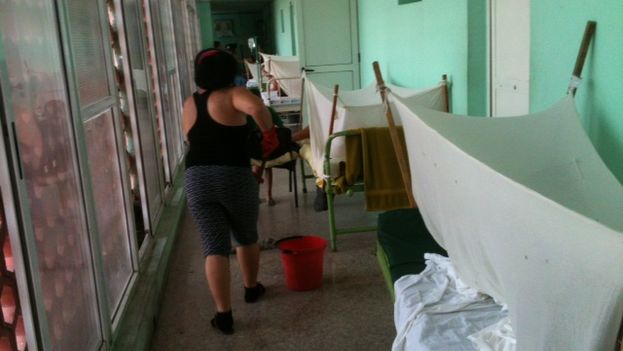
![]() 14ymedio, Juan Carlos Fernandez, 29 September 2015 – The fear of contracting dengue fever keeps thousands of families on tenterhooks in the province of Pinar del Rio, especially those with young children.
14ymedio, Juan Carlos Fernandez, 29 September 2015 – The fear of contracting dengue fever keeps thousands of families on tenterhooks in the province of Pinar del Rio, especially those with young children.
Problems with the water supply are among the main causes for the outbreak, said a family doctor from the Hermanos Barcón People’s Council, who requested anonymity. “People build tanks, cisterns and try to store water and that is a constant focus of vectors,” he says. “There are areas in the city that only receive water every fifteen days,” adding that the “poor state of the health centers in the capital makes many people with the disease try to hide it so they will not be forced to go to a hospital,” thereby increasing the risk of contagion.
Hospitals have reinforced their services to deal with cases of dengue fever, especially Leon Cuervo Rubio Hospital and Abel Santamaría General Teaching Hospital, which has one room only for pregnant women. It has also set up a room at the Simon Boliver Health Polytechnic and another for infants in the Turcios Lima polyclinic, while in the Pepe Portilla Pediatric Hospital the avalanche of fever cases has required them to place beds in the corridors, with mosquito nets to prevent transmission.
Although health authorities spread the word about the increase of cases in the region they have not yet provided data on infections. Dr. Mérida Morales Lugo, head of the International Sanitary Control Program, simply explained last Friday in a statement to the local newspaper Guerrilla that conditions are favorable for “accelerated vector reproduction,” referring to the Aedes aegypti mosquito. However, the specialist said, so far there are no cases of hemorrhagic dengue fever, the most feared form of the disease.
There are confirmed cases of dengue fever in the four health areas of the Pinar del Rio capital and in eight of its People’s Councils, an area that has a population of about 122,000. The disease has also reached the municipalities of San Luis, San Juan y Martinez and Consolacion del Sur, near the provincial capital.
Health authorities have urged people to go to the doctor at the least sign of fever symptoms. Medical students, staff in all the family medicine offices and public health administrative workers have been mobilized along with other workplace employees to search house to house, looking for people with symptoms of the disease.
